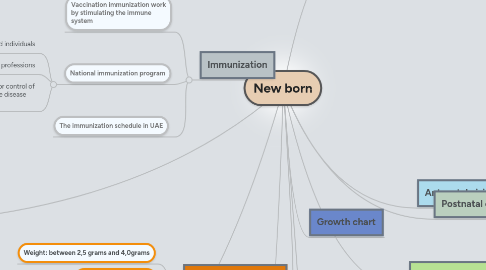
1. Breastfeeding difficulties
1.1. Premature newborns with law birth weight
1.2. Cleft palate and cleft lip
1.3. Reflux disease
1.3.1. gastroesophageal
1.3.2. Severe spitting up
1.3.3. Projectile vomiting
1.3.4. Inconsolable crying
1.3.5. Arching of the back
1.3.6. Refusal to drink milk from the breast
1.3.7. Waking up often at night
1.3.8. Slow weight gain
1.3.9. problems swallowing
2. The APGAR score
2.1. A: Appearance, P: Pulse, G: Grimace, A: Activity, R: Respiration.
2.2. It is given twice, after 1 minute of birth and 5 minutes
2.3. 2 is the best score
3. Full term
3.1. refers to the gestation having lasted between (37 weeks to 40weeks) or 9 months
3.2. Preterm : Born before completing 37 week
3.3. Post term : from week 42 events
4. Birth measurements
4.1. Weight: between 2,5 grams and 4,0grams
4.2. Length: 50 centimeters
4.3. Head circumference: 35 centimeters
5. Breastfeeding
5.1. Benefits for the mother
5.1.1. Reduces the risk of ovarian cancer, breast cancer and type 2 diabetes
5.1.2. Helps in losing weight after birth
5.1.3. Produces more favorable glucose levels, lipid metabolism, and blood pressure
5.1.4. calms the mother down
5.2. Benefits for the infant
5.2.1. Promotes sensory and cognitive development
5.2.2. Protects against infectious and chronic disease
5.2.3. Reduces mortality
5.2.4. Reduces odds of sudden infant death syndrome
5.2.5. A quicker recovery during illness
5.2.6. Reduces occurrence of obesity and childhood metabolic disease
5.2.7. Reduces the risk of developing childhood cancer
5.2.8. Prevent such diseases like type 2 diabetes and leukemia
6. Immunization
6.1. Vaccination immunization work by stimulating the immune system
6.2. National immunization program
6.2.1. Immune compromised individuals
6.2.2. Vaccines for special professions
6.2.3. Vaccination for control of communicable disease outbreaks
6.3. The immunization schedule in UAE
7. Antenatal visits
7.1. The first visit after 12 weeks of pregnancy
7.1.1. Blood pressure test
7.1.2. Collect blood sample
7.1.3. Urine test
7.2. Next vist is every 4-6 weeks up to 36 weeks
8. Scream after birth
8.1. Expansion of the lungs
8.2. Physiological aspects
8.2.1. hypoxia during birth
8.2.2. Temperature difference between the womb and the delivery room
8.2.3. Environmental change
9. Growth chart
10. Congenital anomalies
10.1. Major
10.1.1. Hypospadias
10.1.2. Ventricular septal defect
10.1.3. Congenital dislocation of the hip
10.1.4. Down syndrome
10.1.5. Neural tube defects
10.1.5.1. spina bifida
10.1.5.2. anencephaly
10.1.5.3. encephalocele
10.2. Minor
10.2.1. have no functional or major cosmetic importance
